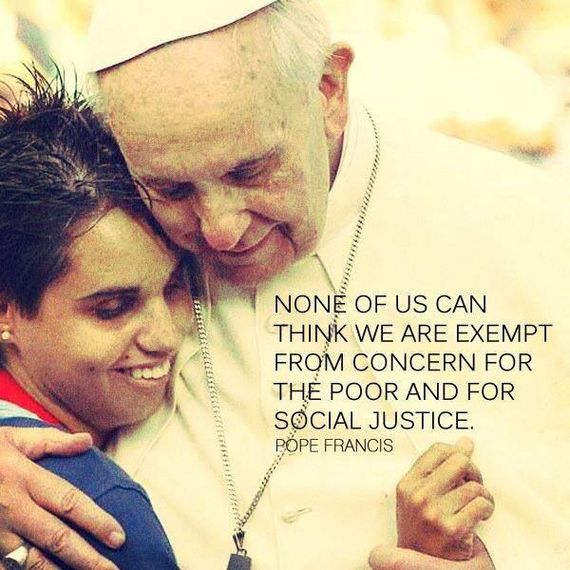
Pope Francis safely arrived back in Rome this morning, ending his historic visit to America. His visit enthused people on all sides of the political and ideological spectrum. People with faith and those without. Christians and non-Christians.
To me, what sets him apart from other faith and non-faith-based figures is his uncanny ability to speak to all people based on certain fundamental human values: justice, equality, peace, opportunity, and concern for the Earth. Based on these values, he expressed his opposition to the death penalty, the manufacturing of weapons, economic inequality, mass incarceration, immigration restrictions, and climate change naysayers.
He did not, however, explicitly express his views on marriage, the women's right to choose, and other social issues that are highly political in our nation. Some pundits have read political stances into his broad statements based on certain assumptions about the Church's point of view. Such interpretations I believe are misguided and are antithetical to the Pope's unwavering commitment "to bring the entire human family together in pursuit of a sustainable and integral development."
This past week, I closely followed the Pope's visit, his carefully chosen words, and the people with whom he chose to spend his time while here. Coded in all of his actions and words, I sensed three instructions for my generation of millennials: walk the talk, lead by example, and think beyond the single-issue.
1. Walk the Talk. The Pope repeatedly emphasized the importance of social and economic justice and cultivating compassion, understanding, and concern for our fellow human beings. He complemented his words by spending time with the least of these, those who are most marginalized in our society: the homeless, the incarcerated, the undocumented, and people living in material poverty.
After addressing the U.S. Congress, he had lunch at a homeless shelter. He visited a school in East Harlem, one of New York's poorest neighborhoods. He visited a Philadelphia prison. He even tweeted gratitude for the "help of domestic workers and caregivers." Many of us millennials share the Pope's values, but how many of us actively pursue those values in our actions?
2. Lead by Example. The Pope is the head of one of the oldest and wealthiest political institutions in the world. Yet, he hasn't been subsumed by his institution's economic and political prowess. He chose to sit on a simple wooden chair built by day laborers for his Mass at Madison Square Garden. He drove around in a little Fiat throughout his U.S. trip. Many of us have noted the humility and simplicity with which the Pope carries on the affairs of his powerful position. Yet, these simple decisions speak to the Pope and his faith's larger aspirations and values. How many of us can bring intentionality into the smaller and bigger decisions of our daily lives? How many of us remain caught in the spiral of Keeping up with the Joneses?
3. Think beyond the Single-issue. Our political landscape is ridden with single-issue voters. However, our lives are not based on single issues. Rather we are caught in, as Dr. King once said, "an inescapable network of mutuality," of interconnection and interdependence. And the Pope revealed this message of interdependence in the way he chose or chose not to speak about certain issues.
When speaking about respect for life, he called all life sacred, particularly the life of those most condemned by our society, those on death row. When speaking about climate change, he called destruction of biodiversity as a threat to the very existence of the human species. What prevents us from leaping away from our passion for single-issue and fit those issues in our holistic aspirations for our humanity and Earth?
For me, the Pope's visit was incredibly inspiring. As a millennial, I often think about the type of world I will be leaving my children if we continue on the current economic and political path. I also know that as the most populous generation, it is we who will inherit the impending trials and tribulations of the uncertainty of our economy and ecology.
While we did not play a role in creating most of these systems, we certainly will be held responsible for creating solutions to these challenges, whether we like it or not. For this end, the Pope's visit was highly instructive and serves as a guide for our personal and collective path forward.
